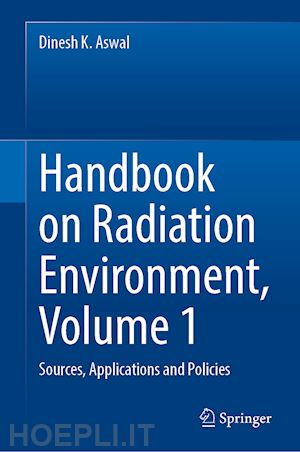

Questo prodotto usufruisce delle SPEDIZIONI GRATIS
selezionando l'opzione Corriere Veloce in fase di ordine.
Pagabile anche con Carta della cultura giovani e del merito, 18App Bonus Cultura e Carta del Docente
This handbook provides a comprehensive review of radiation present in the environment, its sources, dose measurement techniques, exposures in natural and man-made radiation environments, policies governing radiation safety, societal applications of radiation technology, radiological and nuclear events, preparedness, response, and mitigation of radiation emergencies. It covers natural and man-made radiation environment with an emphasis on renewed interest in nuclear energy as a clean and green source of power generation. Additionally, it reviews various approaches to understand the fate and behaviour of radionuclides in the terrestrial and aquatic ecosystems. It also presents nuclear technology's diverse applications, from diagnostic and therapeutic nuclear medicine to materials modifications and sustainable waste management strategies and the role of ionizing radiation in ensuring food security and safety. The handbook also highlights the existing (internationally adopted) radiation protection policies, which are originated from linear-no-threshold (LNT) model of dose-response characteristics. The scientific basis of LNT-model and its limitations at low doses prompts a revision of the exiting radiation protection policies for better utilization of the benefits of ionizing radiation.
The handbook serves as a comprehensive resource for students, academicians, scientists, engineers, and policymakers interested in seeking an in-depth knowledge of radiation and the multifaceted applications of radiation technology while protecting human health and the environment.
Introduction.- Natural Radiation Environment.- Man-made Radiation Environment.- Evolution and Implementation of Radiation Protection Policy.- Ionising Radiation Metrology.- Low Dose Radiation Effects in Biological Systems.- Renewed Interest in Nuclear Energy.- Cost Benefit Analysis of Current Radiation Protection Policy.- Lessons from the Major Nuclear Accidents: (Environmental and Radiological Impact).- Alternative Radiation Protection Policies and Implications.- Radiation Induced Quantum Biology Effects.- New Challenges in Terrestrial and Marine Radioecology.- Assessment of Radionuclide Transfer in Terrestrial Ecosystem.- Transport and Fate of Radioactivity in Aquatic Ecosystem.
Dr. Dinesh Kumar Aswal holds prominent roles within the Trombay Council (TC) at the Bhabha Atomic Research Center (BARC), serving as its senior member. He also assumes key positions such as Director of the Health Safety and Environment Group (HS&EG), Associate Director of the Medical Group, and Director of the National Radiation Emergency Response under the Department of Atomic Energy, Government of India. His responsibilities encompass safeguarding nuclear and radiological safety across the entire nuclear fuel cycle. Internationally renowned for his scientific expertise, administrative prowess, and diplomatic acumen, Dr. Aswal has an extensive list of accomplishments. He has edited nine books, authored over 50 book chapters, filed nine patents, and published more than 500 journal and conference papers, with an impressive H-index of 56 and over 11800 citations. Dr. Aswal's leadership extends beyond his scientific endeavors. He has held administrative positions in prestigious national institutes, including Director of the National Physical Laboratory (CSIR-NPL) in New Delhi, Director of the Central Electronics Engineering Research Institute (CEERI) in Pilani, and Director of the Science, Technology, and Development Studies (CSIR-NISTADS) in New Delhi. He has also chaired the National Accreditation Board for Testing and Calibration Laboratories (NABL) and served as Secretary of the Atomic Energy Education Society (AEES) in Mumbai. His notable achievements include implementing the redefined International System of Units (SI) based on fundamental and atomic constants and establishing the National Atomic Clock Ensemble to generate Indian Standard Time (IST), renowned for its exceptional accuracy.
Furthermore, Dr. Aswal has contributed significantly to India's nuclear program, developing key technologies such as radiation detectors and hydrogen sensors. He has also pioneered technologies to address societal challenges, including recycling plastic waste, measuring air pollution and enhancing security features for currency notes. Internationally, he has been invited to deliver lectures and engage in collaborative research at esteemed institutions across Japan, France, Germany, Israel, the United States, and more. He is a Fellow of the International Association of Advanced Materials (FIAAM), Sweden, and the National Academy of Sciences, India (FNASc), among other prestigious honors. Additionally, he serves as Chairman or member of various national committees of the Government of India, further cementing his impact and influence in the scientific community.











Il sito utilizza cookie ed altri strumenti di tracciamento che raccolgono informazioni dal dispositivo dell’utente. Oltre ai cookie tecnici ed analitici aggregati, strettamente necessari per il funzionamento di questo sito web, previo consenso dell’utente possono essere installati cookie di profilazione e marketing e cookie dei social media. Cliccando su “Accetto tutti i cookie” saranno attivate tutte le categorie di cookie. Per accettare solo deterninate categorie di cookie, cliccare invece su “Impostazioni cookie”. Chiudendo il banner o continuando a navigare saranno installati solo cookie tecnici. Per maggiori dettagli, consultare la Cookie Policy.